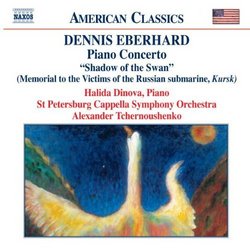| All Artists: Dennis [Composer] Eberhard, Alexander Tchernushenko, St. Petersburg State Academic Capella Symphony Orchestra, Halida Dinova Title: Dennis Eberhard: Piano Concerto "Shadow of the Swan"; Prometheus Wept Members Wishing: 0 Total Copies: 0 Label: Naxos American Release Date: 7/20/2004 Genres: Pop, Classical Styles: Vocal Pop, Chamber Music, Forms & Genres, Concertos, Historical Periods, Classical (c.1770-1830) Number of Discs: 1 SwapaCD Credits: 1 UPCs: 636943917626, 636943917626 |
Search - Dennis [Composer] Eberhard, Alexander Tchernushenko, St. Petersburg State Academic Capella Symphony Orchestra :: Dennis Eberhard: Piano Concerto "Shadow of the Swan"; Prometheus Wept
CD Details |
CD ReviewsTwo Serious Works J Scott Morrison | Middlebury VT, USA | 12/15/2004 (3 out of 5 stars) "Disasters of modern-world technology serve as the inspiration for these two very somber works by Dennis Eberhard (b. 1943). The Challenger disaster and the sinking of the Russian submarine, Kursk, are invoked in the Piano Concerto, Hiroshima and the Chernobyl nuclear disaster in 'Prometheus Wept.' The latter title, of course, refers to Prometheus's gift to humankind of fire, a very direct reference to the mishandling of nuclear power in the two disasters invoked in that work. The Concerto is subtitled 'Shadow of the Swan,' which is a line from Yevgeny Yevtushenko's poem, 'Requiem for Challenger.' Eberhard was writing the piece when the Kursk went down and he dedicated it to the men who lost their lives. It is in three movements: 'The Fall,' 'Requiem,' and 'The Quickening.' The first begins with a dissonant descent to the depths of the orchestra, illustrating the disastrous fall of the submarine. This is followed by watery figures, orchestrated expertly and from a sound world similar to that of Penderecki or Ligeti. In the second movement Eberhard writes in an entirely different style, perhaps influenced by the artful simplicity of Pärt or Gorecki. Divided strings mourn for the lost victims. Then, in movement three, bustling minimalism of the John Adams sort takes over--repetitive figures, harmonic chasteness leavened occasionally by coruscating flashes of light. This is not a typical showy and virtuosic piano concerto, although soloist Halida Dinova has plenty of difficult passages to negotiate. She does a fine job. The St. Petersburg Cappella Symphony Orchestra sounds a bit underpowered, especially in the strings, but plays with commitment and style under conductor Alexander Tchernoushenko. 'Prometheus Wept' is a 14-minute dirge to the victims of the Hiroshima atom bomb blast of August 1945. It begins with a solo bass, Piotr Migunov, intoning in Russian orthodox style verses from the Book of Revelation (mistakenly referred to repeatedly in the booklet notes as 'Revelations'). The bass line, sung in Ukrainian, is a slow chromatic rise from the bass's lowest to his highest register and goes on, unaccompanied, for about four minutes, too long for it to retain much interest. Throughout the word 'Chernobyl' is substituted for Revelation's 'wormwood.' This is followed by a Pendereckian conglomeration of glissandi, tone clusters, open harmonies. It made little effect on this listener. The Piano Concerto is interesting and worth rehearing. The purposefully disjointed use of eclectic styles is a bit jarring, although it becomes more effective after the initial shock ebbs. The back cover trumpets that Dennis Eberhard is 'one of America's leading composers.' I wonder whose judgment that is. I'd never heard of him, nor had several acquaintances who are more au courant with the currents in contemporary American music. The booklet notes don't tell us anything much about him, either. He is a talented and skillful composer, but this music is probably not destined to enter the canon of great American music. Scott Morrison" Worth hearing repeatedly David F. Wrench | Portland, OR United States | 07/08/2009 (4 out of 5 stars) "The first time I heard these works I was not sure that I would want to hear them again. As the previous reviewer noted,"Prometheus wept" seemed too much the same, and in listening to "The Shadow of the Swan" I was too aware of the events it was commemorating to be fully appreciative of the music. Returning to them I concluded that the fault had been with me. Appreciation of these works requires that one listen with adequate leisure and give one's full attention. For me, not only the greater work but also the dirge rewarded repeated listenings.
As Scott Morrison noted, Eberhrd was a talented and skillful composer. Unfortunately he died before his talent could be fully realized. " |

